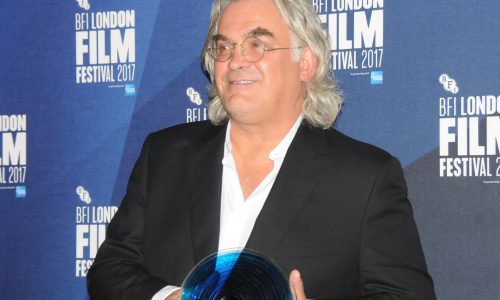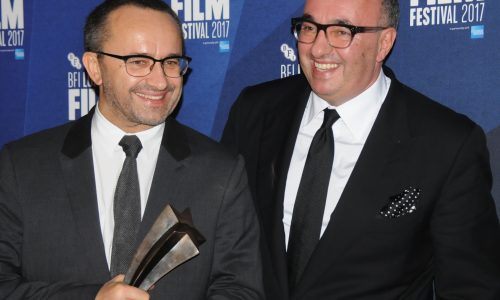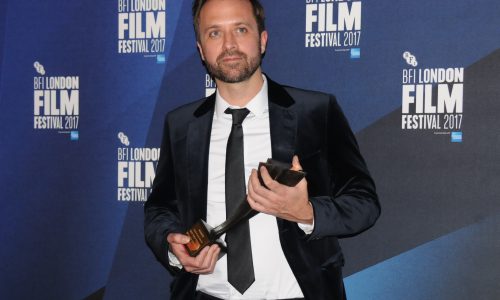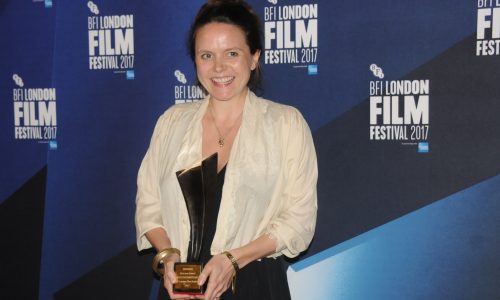One of Britain’s most successful directing exports, Paul Greengrass, has been honoured with the British Film Institute’s highest accolade, the BFI Fellowship, at a ceremony that’s been overshadowed by the ongoing scandal of the movie mogul Harvey Weinstein’s treatment of women in Hollywood.
On one of the most prestigious nights of the British film calendar, the London Film Festival Awards, Weinstein was referred to by name or obliquely by many of the awards presenters and winners. Even the awarding of Greengrass with the BFI Fellowship was mired in controversy, because Weinstein himself is in possession of the same honour, having received it in 2002. On the day that the Academy that hands out the Oscars expelled him, the BFI revealed that its board would be considering Weinstein’s fellowship in the coming week.

Accepting his award, Greengrass himself acknowledged that it had been a difficult week for the industry and said everyone needed to listen to the stories, learn from them and act. He told me, “It’s an important moment for our industry. It’s a difficult moment for our industry. And I think we need, as an industry, to reflect on what has clearly been going on and make changes and ensure that the industry continues to improve. I don’t believe that behaviour defines the movie business. I think it’s clearly been a massive problem that has to be addressed. I’m not minimising it at all. You can’t look at these issues without doing something. As an industry we have to respond. Words don’t mean anything. I think as an industry we have to call it out and that’s clearly what’s being done. And that’s important and good.”
But Greengrass had been invited to the event to be honoured for his own film-making career, forty years – almost to the day – after he started his first job, making documentaries for Granada. In the intervening years, he’s become one of the most passionate and versatile directors, working on both low budget films and blockbusters, real-life stories and fiction. His acclaimed works include Bloody Sunday, United 93, Green Zone, Captain Phillips and three of the Bourne films. But he still couldn’t believe he’d been recognised alongside previous Fellows, such as Stephen Frears, Tim Burton, Danny Boyle, David Cronenberg, Sir Christopher Lee and Cate Blanchett. “I think it’s just wonderful and I was a bit shell-shocked when they listed the other people who’ve been up on that stage. I just find it a great honour and it’s truly very humbling.”
As well as the Fellowship, the London Film Festival Awards hand out prizes to honour the best films in a number of categories. This year, a newly designed trophy, the upright Star of London, replaced the circular stone London Star that has been presented every year since the awards were inaugurated in 2009.

And this year, the top prize in the official competition went to the Russian director Andrey Zvyagintsev. Loveless, which was well received on its world premiere in Cannes but missed out on Palme d’Or, is about a divorcing couple who work together to look for their son, whose been driven away by their arguments. It’s Zvyagintsev’s second victory at the London Film Festival, after Leviathan in 2014. “Luckily, we’re able to touch something very important, while we’re investigating human nature, which is absolutely relevant to all international audiences across the globe,” he told me in Russian, translated by his regular producer Alexander Rodnyansky. “We try to tell the human stories in a way that doesn’t make very important the social, political and other specifics of a particular country. It is a human story but it’s told in Russian, about Russian people and Russian society and it makes it understandable for everyone outside.”
At an awards ceremony that’s in only its ninth year, Zvyagintsev is the second director to have won the top prize twice, after France’s Jacques Audiard won for both A Prophet and Rust and Bone.

South Africa’s John Trengove won the Sutherland Award for the Best First Feature, for The Wound. It’s set within the Xhosa community of South Africa’s Eastern Cape and centres on a young man who develops romantic feelings for an elder after having a ritual circumcision as a rite of passage into manhood. Trengove said there was a hostile response in his home country when he first broached the subject of making a film that touched on ritual circumcision and homosexuality. But he said that changed when people saw the film and the country is now ready for that conversation. As for his own response to the prize, he said “Personally, it’s the best possible affirmation to keep on going, to keep on doing what I feel strongly about. There are so many voices out there telling us not to do the things that we most want to do, for all sorts of reasons. And this was exactly that project. This was the film where for every reason, this was a kind of unproduceable, or non-commercial project. So to have this kind of affirmation is to say actually, go for it – take those risks and speak earnestly and passionately about things that matter.

The Grierson Award for Best Documentary went to Kingdom of Us, Lucy Cohen’s study of a West Midlands family, dealing with the aftermath of their father’s suicide. Cohen said mental health was a subject she’d long been passionate about. She said she hoped people watching the film would take away an understanding that mental illness and suicide are very complicated and difficult subjects. “It’s OK to talk about your feelings, it’s OK not to be strong all the time, there shouldn’t be so much stigma around mental illness, preventing people from talking about it.”
For the first time, the LFF honoured the best short film, with the award going to The Rabbit Hunt, a documentary about what its name would suggest, set an hour from Donald Trump’s mansion in Florida, its American director Patrick Bresnan was keen to point out. Accepting his award, he addressed the biggest controversy in the industry at the moment head on. “Harvey Weinstein is a piece of shit and so is our President. If you grope women, you’re a piece of shit and you don’t belong in this industry.”
